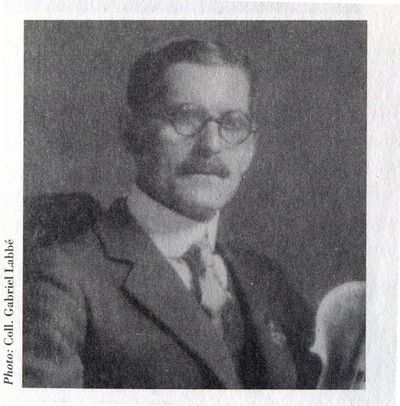Annotation:Joys of Québec: Difference between revisions
No edit summary |
No edit summary |
||
| Line 6: | Line 6: | ||
|f_source_for_notated_version=Yankee Ingenuity (Mass.) [Brody]; Pete Sutherland (Vermont) [Phillips]. | |f_source_for_notated_version=Yankee Ingenuity (Mass.) [Brody]; Pete Sutherland (Vermont) [Phillips]. | ||
|f_printed_sources=Brody ('''Fiddler's Fakebook'''), 1983; p. 150. Jean Duval ('''La Musique de Fortunat Malouin 1870-1935'''), 2020; No. 7, p. 11. Miller & Perron ('''Fiddlecase Book of 101 Polkas'''), 1978; No. 77. Phillips ('''Traditional American Fiddle Tunes, vol. 1'''), 1994; p. 128. | |f_printed_sources=Brody ('''Fiddler's Fakebook'''), 1983; p. 150. Jean Duval ('''La Musique de Fortunat Malouin 1870-1935'''), 2020; No. 7, p. 11. Miller & Perron ('''Fiddlecase Book of 101 Polkas'''), 1978; No. 77. Phillips ('''Traditional American Fiddle Tunes, vol. 1'''), 1994; p. 128. | ||
|f_recorded_sources=Arhoolie C-334, Joe Cormier (Cape Breton/Mass.) - "Masters of the Folk Violin" (1989). RCA Victor-Bluebird series B-1143 (78 RPM), Joseph Bouchard (1938). Columbia | |f_recorded_sources=Arhoolie C-334, Joe Cormier (Cape Breton/Mass.) - "Masters of the Folk Violin" (1989). RCA Victor-Bluebird series B-1143 (78 RPM), Joseph Bouchard (1938). Columbia 34144-F (78 RPM), Fortunat Malouin (1928). Fretless 200A, Yankee Ingenuity- "Kitchen Junket" (1977). Gusto 104, Jerry Rivers- "30 Fiddler's Greatest Hits." | ||
|f_see_also_listing=Jane Keefer's Folk Music Index: An Index to Recorded Sources [http://www.ibiblio.org/keefer/j06.htm#Joyofqu]<br> | |f_see_also_listing=Jane Keefer's Folk Music Index: An Index to Recorded Sources [http://www.ibiblio.org/keefer/j06.htm#Joyofqu]<br> | ||
Alan Snyder's Cape Breton Fiddle Recordings Index [http://www.cbfiddle.com/rx/tune/t1050.html]<br> | Alan Snyder's Cape Breton Fiddle Recordings Index [http://www.cbfiddle.com/rx/tune/t1050.html]<br> | ||
Revision as of 15:48, 25 October 2022
¬¬¬
X: 1 T: Joys of Quebec (Joies de Qu\'ebec) O: French Canadian Z: 1997 by John Chambers <jc:trillian.mit.edu> M: 4/4 L: 1/4 K: A e/e/ \ | "A"e/c/c/c/ ce/e/| e/c/c/c/ ce/e/| "A"f/A/e/A/ d/A/c/A/| "E7"d/B/B/B/ Bd/d/| "E7"d/B/B/B/ Bd/d/| d/B/B/B/ Bd/d/ |1 "E7"ee g/f/e/g/| "A"f/e/^d/f/ "E7"e :| |2 "E7"ee/e/ "D"f/e/f/g/| "A"a3 |: c/d/| "A"Mez"D"Mfz | "A"e3/2f/ eA/B/| "A"cc "D"df | "A"c3/2d/ cA/c/|| BA GA | "E7"B3/2c/ BB/c/|1"E7"de fg | "A"f/e/^d/f/ "E7"e:|2 "E7"de f/e/f/g/| "A"a/f/e/c/ A |]

JOYS OF QUÉBEC (Les Joyeuses Québecoises). French-Canadian, Reel or Polka (2/4 time). A Major. Standard tuning (fiddle). AA'BB' (Brody): AA'BB'C (Phillips). The reel was popularized by, and is perhaps the composition of influential Saint-Sauveur, Québec, fiddler and traveling salesman biography:Fortunat Malouin (1870-1935), who recorded in the 1920's for the Starr and Columbia labels. The third interesting section, which Jos Bouchard (1905-1979) included in his 1938 recording, is rarely played, although it is Bouchard's version that re-popularized the tune. Malouin recorded the reel in New York City in 1928 for Columbia Records (backed with another of his compositions, "Reel de Rimouski"). The melody was included in Montreal musician, publisher, and music dealer A.J. Boucher's (1869-1927) Le Repertoire du Violonneux [sic] (Dec., 1933), a collection of Quebecois tunes that included versions of all eight tunes that Malouin recorded--nearly all under different titles. "Les Joyeuses Québecoises" appears in Boucher's volume as "Variations sur un air canadien", in five parts (the last two requiring position playing on the violin). Researcher Jean Duval believes that Boucher and Malouin were rivals or competitors, at least from Boucher's point of view, and that Boucher may have been seeking to point out that "Les Joyeuses Québecoises" was not Malouin's composition, but rather a part of older Quebecois repertory appropriated by him. He also may have been trying to 'show Malouin up' by printing (as the first piece in the collection) a version with (as Duval says) "fairly acrobatic variations", perhaps to show his musical superiority over Malouin[1]. Duval suspects that the tune may have traditional origins, and may not be a Malouin original.

